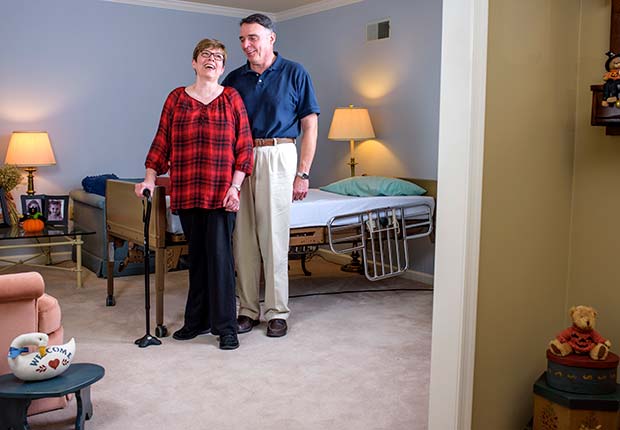AARP Hearing Center

By Cristina Rouvalis
Two years ago, Joanne Griffiths was healthy and vigorous at 63, walking all over Disney World with her grandkids. A month later, after carotid artery surgery, she suffered a stroke that left her unable to walk or lift her left arm, reducing her voice to a barely audible rasp.
Joseph, her husband of 41 years, became her full-time caregiver. It’s been a jarring change for a couple who used to trek two miles in their neighborhood just outside Lancaster and travel abroad together.
“It’s overwhelming,” said Joseph, 66, a retired product development manager. “It was a drastic, drastic change. She went from being someone who was very active to not being able to do anything.”
Joseph had one advantage that helped him keep his wife out of a nursing home. The doctors, nurses and therapists at the rehabilitation center, where she stayed after the hospital, gave him detailed care instructions. They showed him how to put her arm in a splint and her leg in a brace and transport her from the bed to her wheelchair.
“If I hadn’t had the preparation I had, I would have thrown up my arms after a week or so,” he said. “I think it should be mandatory.”
Officials at AARP Pennsylvania agree.
When the new legislative session begins Jan. 6, AARP will make a major push for passage of the Caregiver Advise, Record, Enable (CARE) Act. The bill would require hospitals to give caregivers in-person instructions for tasks such as injections and wound care so they can confidently perform them at home.
While some hospitals prepare family members to care for a relative, others simply hand them a stack of papers upon the patient’s release, said Ray Landis, AARP Pennsylvania advocacy manager. “The problem is that some folks get sent home and don’t know what to do. Either they are so frustrated that they end up taking them to the nursing home, or something goes wrong.”
State’s aging population
More older people will face the burden of caring for spouses and other relatives as the state’s 65-and-older population, already fourth largest in the nation, continues to grow. By 2030 about 1 in 4 Pennsylvanians will be 65 or older.
The Hospital & Healthsystem Association of Pennsylvania said in a statement that it “supports the overall goals of the CARE Act and recognizes the importance of health care providers engaging a patient’s family or medical advocate in the patient’s care.”
During the upcoming session, AARP also hopes to lobby for passage of a bill to allow nurse practitioners to operate independently of doctors. Landis expects the bill, sponsored by Sen. Pat Vance (R-Cumberland County), to be reintroduced after it was shelved in the last session.
“With limited numbers of physicians, the nurse practitioners will also be able to visit the family caregivers and give them instructions and assistance on day-to-day situations,” Landis said. “The more people we keep out of the hospital, the better it is for every Pennsylvania taxpayer.”
Several nurses organizations support the bill, but Bruce MacLeod, M.D., president of the Pennsylvania Medical Society, called it “a step in the wrong direction: The practice of modern medicine requires a team-based approach where care is coordinated.”
Landis said AARP also will push to increase funding and awareness of Pennsylvania’s Family Caregiver Support Program. The income-based program provides caregivers a monthly stipend of up to $200 for respite care, medical supplies and other expenses.
Fortunately, Joanne and Joseph Griffiths won’t need financial aid, and Joanne has recovered enough to walk with a cane. Still, Joseph appreciates programs that help to lighten the load for caregivers.
“I am in good shape. I lift weights. I am not a frail 66-year-old,” he said. “But it has been emotionally and physically challenging.”
Cristina Rouvalis is a writer living in Pittsburgh.































































